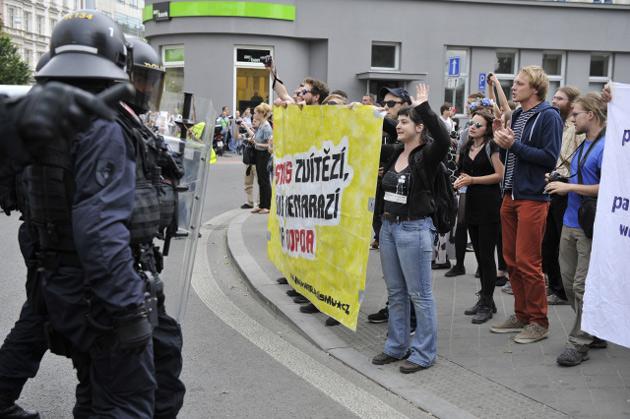Times change. During the 1930s, the ruling elites were discussing deporting refugees to Madagascar.
Today the Czech President says he wants to imprison refugees “in some empty places in Africa” – perhaps just temporarily. The barbed wire that used to adorn the borders of some European countries was once ceremoniously cut down, but today it is being reintroduced.
Previously, in the German Democratic Republic (former East Germany), the slogan “We are the nation” sounded like a call for democratic change, but today it can be heard mainly at demonstrations by those who defy Western-style democracy. Previously, the Prime Minister of the Czech Republic pledged to receive the number of refugees determined by EU quotas, but today he does not object when the Czech Interior Minister declares that no refugees will be allowed into the country this year.
Simply put, what applies in Germany does not have to apply here in the Czech Republic, by any means. Discussion over.
The interpretation of the concept of “extremism” also differs from country to country and from era to era. During communism, the Czechoslovak state considered Václav Havel to be Extremist Number One, even though almost nobody knew who he was.
Overnight he became a “friend of the state” (still in first place). In China or in Russia today, it takes very little for somebody to be considered an extremist – all you have to do is hold a different opinion.
During Nazism it was the “extremists” who ended up in the concentration camps, and after the war, some of the main actors of that monstrous ideology awaited execution. Now the opinions of those who supported such “concentration” are not just tolerated, but frequently direct state policy.
Who can make sense of this all? Take the example of Tomáš Vandas, who used to chair the Workers’ Party (DS) in the Czech Republic before it was abolished by the court, and who declared at a 1 May demonstration in Brno six years ago that “Our beautiful Czech country will be flooded by a destructive tsunami, a wave of immigrants that will destroy everything that we consider beautiful and hold dear”.
Michal Glas gave a speech with him on that occasion in which he added that “Time is running out for us and for all of Europe, hundreds of thousands of immigrants are arriving daily on the shores of Europe. It’s just a question of time before we, the ethnic Europeans, will be overrun by the sheer numbers of these monsters.”
Does giving that speech make Glas an extremist, or just a good forecaster? Michal Mazel, who in those days was still an expert on political extremism, told the court the following about the speech given by Vandas on that day:
“It introduces an atmosphere of a mortal threat bordering on catastrophe that is posed to our country by immigrants. While it is apparently an exaggeration, nevertheless, similar comparisons are able to induce, at the very least, negative perceptions of entire groups of the population who enjoy legal protection on the territory of the Czech Republic. The term ‘immigrant’ applies to legal immigrants, and many immigrants have even become citizens of the Czech Republic. There is no proof available of these allegations of a ‘destructive tsunami, a wave … destroying everything beautiful’, this is an emotionally grossly exacerabated, negative remark about an entirely legitimate group in this society.”
For that incitement to hatred, the Municipal Court in Brno sentenced both those speakers, one year later, to four-month suspended prison sentences and fined them. They had almost finished serving their time when former Czech President Klaus expunged their records through his amnesty at the end of 2012.
Does that mean everybody who has recently expressed themselves in that vein here in relation to refugees is also at risk of being jailed? That depends on the context.
If it can be proven that such people have constantly done their best to achieve their political aims not democratically, but “militarily” – for example, by sparking street battles – then it can easily be assumed that they do run that risk. Certainly, the reintroduction of Nazism would solve the problem that is being called a “tsunami” with lightning speed, but it would do so through methods that are still considered illegal.
At the end of September, after 16 months in custody, some of them spent in solitary confinement, a young Czech citizen was released from prison. The anti-mafia police unit considers him a dangerous terrorist who prepared an attack on a freight train – with the hearty aid of undercover police agents.
The Constitutional Court judge instructed that his handcuffs be removed in the courtroom, saying “That’s not necessary”, and then released him. Does his release pose an increased terrorist threat?
I don’t feel any more at risk after learning this information than I did before. Do you?
Personal contact with refugees can combat fear and prejudices. How is one to even have such contact, though, if the Czech Government simply won’t let them into the country and we are just a waystation here?
Patience is required. As somebody thousands of years ago said, Temporar mutantur, nos et mutamur in illis – The times change and we change with them.

